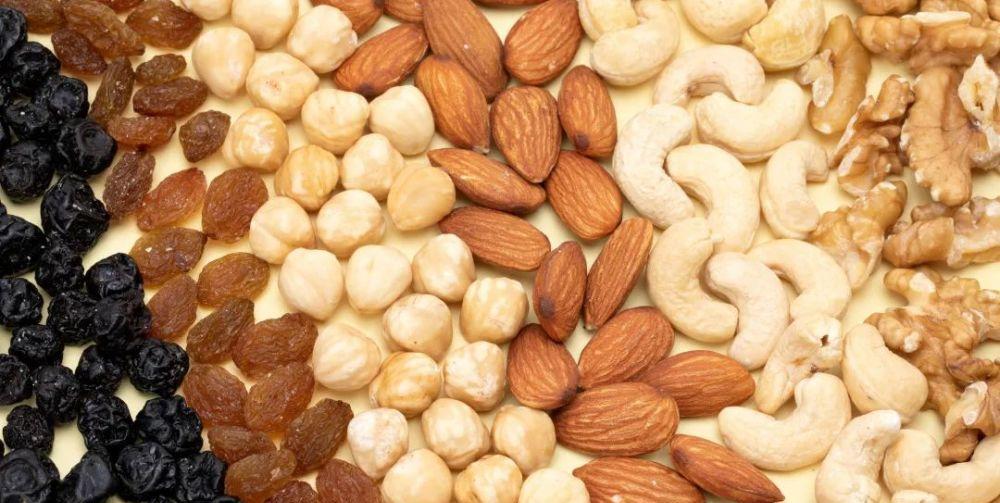Recently, Ms. Chen, 46, in Nanning, was found to have high blood lipids during a physical examination. It is reported that Ms. Chen heard that eating nuts is good for the body, eating a pack every day, eating for three months, and also eating some peanuts and walnuts to "add meals".
Does eating nuts really trigger high blood lipids? How to eat nuts is healthier, an article to interpret clearly.
First, does eating nuts really cause high blood lipids?

not necessarily.
Maybe before she ate nuts for 3 months, she already had abnormal blood lipid problems, but she didn't have a physical examination and didn't know. However, this woman's high blood lipids may also be related to the fact that nuts eat more, because dietary fat is the most important nutritional factor affecting blood lipids, and fat intake should not exceed 20% to 30% of total daily energy. The fat content of nuts is generally above 50%, which means that a bite of nuts and half a mouthful of oil, like our white-collar women who have no activity, the daily energy recommendation is 1800 kcal.
If you have 1 pack of nuts a day, such as 1 pack of 25 grams of cashew nuts, and then eat 2 walnuts, plus 20-30 grams of cooking oil, the fat supply ratio is 20.75% to 25.75%.
Considering that in addition to nuts and cooking oil, other foods also contain fat, and the amount of cooking oil used by foreigners is not the recommended 20-30 grams, the data in 2012 is 42.1 grams, so if you calculate, fat intake is easy to exceed 30%, so this lady found high blood lipids, which may be related to eating nuts for 3 consecutive months.
Second, is it not to eat nuts?
Of course not. Nuts are so nutritious, it's a pity not to eat them.
First, it is rich in protein, dietary fiber, vitamin E and B vitamins.
Secondly, its fatty acid composition is also very powerful. Most of the fatty acids of nuts are mainly monounsaturated fatty acids, which are the kind of fatty acids that olive oil is rich in, which can raise the "good cholesterol" in the body and reduce the bad cholesterol in the body.
In addition, like walnuts are rich in α-linolenic acid, which is an essential fatty acid of the human body, that is to say, the human body can not synthesize, must be obtained through food, common foods are also flaxseed oil, perilla oil is rich in α - linolenic acid, if these two oils are not eaten, then eating some walnuts is an important way to supplement α-linolenic acid.
In addition, studies have shown that eating nuts in moderation can reduce the risk of cardiovascular disease, high blood pressure, and colon cancer in women. Eating walnuts, almonds, pistachios, hazelnuts, pine nuts, peanuts and other nuts can also help improve blood lipids.
Like Ms. Chen has the habit of eating walnuts and peanuts, if you don't eat too much so that the total fat supply ratio exceeds the standard, you may not be able to check out the problem of high blood lipids, so nuts can be eaten completely, the key is the right amount.
3. What are the precautions for eating nuts every day?
1. Choose the original nuts.
Do not fry, sugar fried, salt fried, this is because fried and sugar frying will increase the intake of oil and sugar, and then increase the risk of excess energy and caries; as for salt, eating more will increase the risk of hypertension and stroke, in addition, sodium ions absorb water in the cells of the oral mucosa, which may also cause inflammation and the problem of oral ulceration, which is what we call "on fire".
2. Control the amount of food eaten.
The Dietary Guidelines for Chinese Residents recommend 70 grams per week for adults, which is equivalent to 10 grams per day, 1.5 walnuts, 3 large cashew nuts, and 7 or 8 almond kernels have 10 grams. If there is very little cooking oil, such as rarely eating stir-fried vegetables, the amount of nuts can also be appropriately increased.
3, children eat nuts should pay attention.
Give nuts to babies under 2 years old, you need to crush them and let them eat.
Babies over the age of 2 can try to eat whole nuts, but sit quietly and eat well, don't tease the child, so as not to choke the nuts into the trachea and cause suffocation.
4, do not give the baby peanut butter.
Peanuts are easy to allergy food, but there is no evidence to show that after the baby is 6 months old and then add allergy-prone foods can prevent allergies, so after 4-6 months of the baby began to add complementary foods, you can give the baby to eat peanuts, but do not give the baby a large spoonful of peanut butter, the reason is also easy to cause suffocation.
In addition to eating nuts directly, they can also be mixed into cold dishes, put into yogurt, porridge, beaten into milkshakes, and steamed into pasta. But it is best not to bake at high temperatures, because the baking temperature is too high, which is easy to cause fat oxidation.
Today's interaction: About nuts, what are your ways to eat, share.